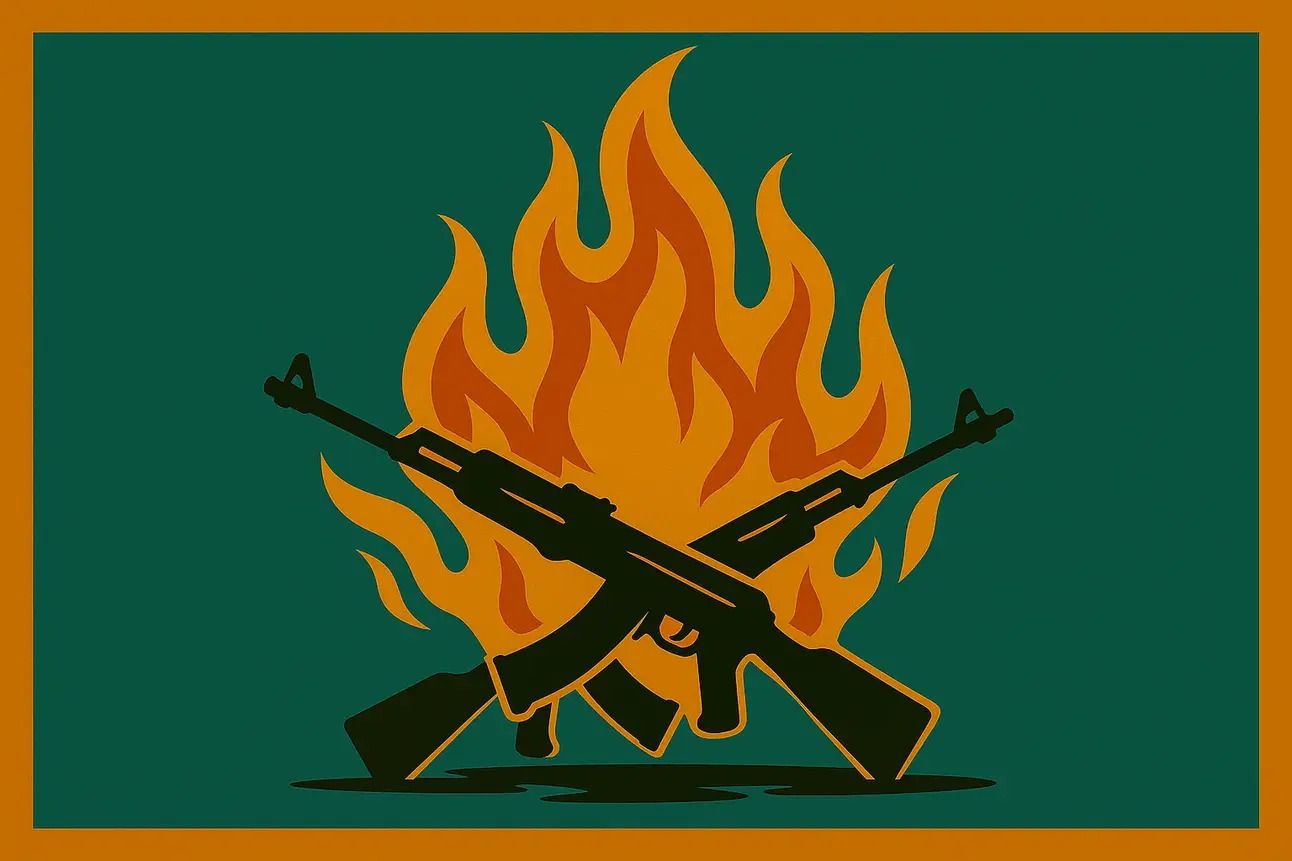Join over 4 million Americans who start their day with 1440 – your daily digest for unbiased, fact-centric news. From politics to sports, we cover it all by analyzing over 100 sources. Our concise, 5-minute read lands in your inbox each morning at no cost. Experience news without the noise; let 1440 help you make up your own mind. Sign up now and invite your friends and family to be part of the informed.

Bottom Line Up Front (BLUF)
The PKK begins disarmament, signaling a potential end to decades of insurgency in Turkey.
Ethiopia's Grand Renaissance Dam is now complete, intensifying Nile Basin diplomacy.
Taiwan's Han Kuang drills simulate a Chinese invasion while China quietly rehearses one too.
Russia’s war widens as North Korea offers troops. Trump issues a 50-day ultimatum then backtracks when Russia balks.
Kazakhstan goes crypto as one of the first Central Asian nations to embrace bitcoin as a strategic currency.
Hey everyone—
Welcome to The Under Report, your weekly intelligence brief about the stories that move the world without making headlines.
I started this weekly newsletter to make geopolitics clear and accessible to everyone. We can understand the world without bombastic headlines, partisan moralization, or fear mongering. I'm so glad to have you all along for the ride and I can't wait to grow more.
Share The Under Report if you know someone who would appreciate a weekly intel update. Also, make sure to check out our sponsors to keep the Under Report rolling.
— Eric
P.S. Check out the secret link in my Tin Foil Hat at the end.
1|PKK Begins Disarmament in Iraq
What happened: In a remote valley outside of the Northern Iraqi city of Sulaymaniyah, fighters representing the Kurdish Worker's Party (PKK) gathered last week to burn weapons in a symbolic ceremony of peace with representatives of the Turkish military. The disarmament comes months after Abdullah Öcalan, the group’s jailed leader, called for an end to armed resistance against Turkey. Ankara is calling this a “new page” in history.
Why it matters: The PKK-Turkey conflict has killed over 40,000 people since 1984. This moment marks the beginning of a potential peace process but the road ahead involves political compromise, reintegration, and trust-building. The beginning of a peace process is just that, a beginning.
What we’re watching: Whether Turkey enacts promised legal reforms for Kurdish rights. Whether the ceasefire holds across the Turkish-Syrian border. And whether this deal opens the door to deeper reconciliation. We should also keep an eye on Erbil, Iraqi Kurdistan has been seen as a safe zone for Kurdish organizations. (More)
2|Ethiopia’s Mega-Dam: Finished, But Far From Resolved
What happened: After 13 years of construction, Ethiopia has completed the controversial Grand Ethiopian Renaissance Dam (GERD). Prime Minister Abiy Ahmed announced the milestone on July 11, calling it a “symbol of African pride.” Egypt and Sudan, who depend on the Nile, were less enthusiastic as this could shift power towards the ascendent Ethiopia.
Why it matters: With full commissioning expected in September, GERD could double Ethiopia’s power capacity. But, damming a river means generating power while restricting water downstream. Both Sudan and Egypt are concerned about the downstream effects of Ethiopian power generation. Diplomatic efforts to reach a water-sharing agreement have stalled for over a decade. Food insecurities follow from water restriction, both have been violent flash points in East Africa.
What we’re watching: Whether Egypt will renew calls for international arbitration. Whether the dam becomes a bargaining chip in future Horn of Africa diplomacy. And whether Ethiopia uses its power surplus to boost regional clout. (More)
3|Taiwan Simulates Invasion, China Rehearses One Too
What happened: This week, Taiwan launched its largest-ever “Han Kuang” military exercises, simulating a Chinese amphibious assault, cyberattack, and missile strikes. In the streets of Taipei, volunteers trained in emergency response drills. On the island of Penghu, troops deployed sea mines and live-fire artillery. Meanwhile, Chinese barges capable of deploying tanks were spotted off Fujian. This is as close to a fully simulated war as the region has gotten.
Why it matters: The drills come as U.S. weapons systems like HIMARS, Patriots, and Abrams tanks arrive in Taiwan. But Beijing is rehearsing too. The PLA has developed new amphibious barges and deployed its Shandong aircraft carrier past the first island chain. These barges are built to evade Taiwanese defenses but images have been made public which indicates public messaging.
What we’re watching: Whether China uses the drills as a pretext for a show of force. Whether the U.S. ramps up presence in the Taiwan Strait. And whether Taiwan’s reservist-heavy defense strategy proves viable. (More)
4|North Korea Sends Troops, Trump Sends an Ultimatum
What happened: The Ukraine war is expanding in spite of numerous ceasefire attempts. According to South Korean intelligence leaks, North Korea plans to send up to 30,000 troops to Russian-occupied territory in Ukraine. This would expand the first direct troop deployment by Pyongyang since the Korean War. Meanwhile, President Trump announced a 50-day ultimatum which was quickly rebuffed by Russia as a "theatrical ultimatum." Washington then sent Patriot missile defenses to Kyiv. This conflict isn't going anywhere for awhile.
Why it matters: North Korea’s involvement marks a new East–West axis of confrontation. Trump’s threat of fresh sanctions and Patriot missile transfers to Ukraine could reshape NATO dynamics. It also shows a Russia which has dug its heels in through both diplomacy and the military.
What we’re watching: If and when Russia integrates DPRK troops. Will they use them optically or actually on the frontlines again? Several have already been captured. We should also look at how China responds to an increasingly trilateral conflict. Meanwhile, Ukraine has new defensive systems, can those stop the Russian onslaught? (More)
5|Kazakhstan Quietly Embraces Crypto to Cement Digital Sovereignty
What happened: Kazakhstan’s central bank and Ministry of Digital Development announced a sweeping integration of cryptocurrency into the country’s financial system. Key moves include granting long-term licenses to exchanges like Binance and Upbit, expanding central bank digital currency (CBDC) pilot programs, and positioning the Astana International Financial Centre as a regulated hub for digital asset trading. The shift comes as Kazakhstan seeks to reassert regional independence and modernize its monetary infrastructure following tensions with Russia and energy market disruptions.
Why it matters: Kazakhstan is one of the world’s top Bitcoin mining nations, and this marks a strategic pivot from crackdown to coordination. The policy shift could make the country a model for hybrid financial governance—blending central authority with decentralized finance. It also reveals a post-Soviet state asserting sovereignty not through military power, but through monetary
What we're looking for: Crypto businesses emerging from the Kazakh digital city program. Scams, where there is crypto there are also scams. We should also look for moves that don't comply with the post-Soviet Central Asian order. (More)
Eric's Tin Foil Hat
Network effects are a force of nature all their own in the modern world. But networks look a bit differently now than they did in the past. While they used to be tax systems, trade routes, and the control of empire, now they are user bases, power customers, and currency holders.
Spheres of influence can be physical. The Turkish military has influenced the Kurds to approach the negotiating table because they share a region. But they can also be digital, El Salvador and Kazakhstan choosing cryptocurrencies to ease off international influence. This is only the beginning of the change. More and more we will see interconnections in ways which balk tradition.
This makes prediction more difficult and urges caution when pulling a string. While looking at the world I encourage you to observe the types of connections which were not possible in the previous decade. It's also important to imagine what time of indicators might be flashing in the networks of the next century.
Here's the secret link! (impressive footage from the recent developments in Iraqi Kurdistan)
About Eric
Eric Czuleger is a journalist and travel writer who has lived and worked in over 47 countries. He holds a masters degree from the University of Oxford and he is completing a National Security degree from the RAND school of public policy. He's the author of You Are Not Here: Travels Through Countries That Don’t Exist, and host of the “This Is Not a PsyOp” TikTok channel.
📚 Liked today’s brief? Dive deeper—check out my book You Are Not Here: Travels Through Countries That Don't Exist and explore the world’s unrecognized countries.
💬 Hit reply with your spiciest take—top comment gets featured next week.


